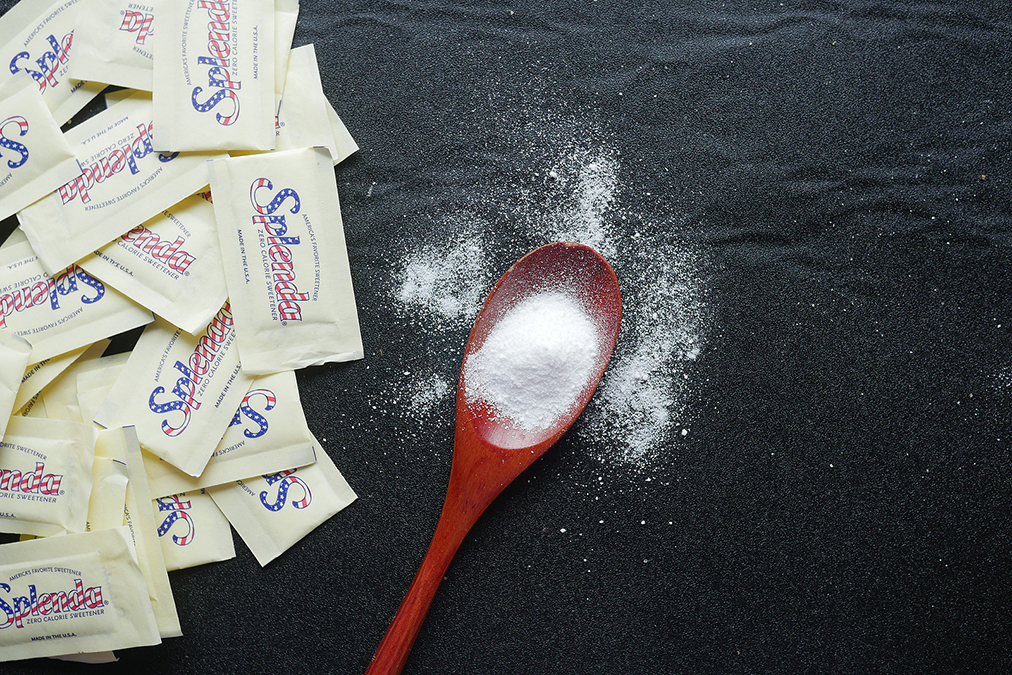 If you’re suffering from type 2 diabetes, you have probably been advised to avoid foods and drinks that are high in sugar.
If you’re suffering from type 2 diabetes, you have probably been advised to avoid foods and drinks that are high in sugar.
And if you want soda, you should go for the sugar-free variety, right?
Wrong, says a new study published in the journal Cell.
Not only will these sugar-free sodas (and other zero calorie candies) spike your blood sugar; they will also alter your body in a way that is nothing short of terrifying!
For this study, American and Israeli scientists recruited 120 healthy Israeli adults and split them into six groups.
The first four groups were intervention groups that were asked to take packets of one of the following sweeteners:
-
1) Saccharin
2) Sucralose
3) Aspartame
4) Stevia
Participants had to take two 1-gram sachets 3 times a day for 2 weeks. This amount is within the acceptable daily intake of these sweeteners.
The intervention groups were compared to two control groups, one of which took sachets of glucose and the other nothing at all.
The researchers took various measurements throughout the study:
-
1. The participants wore blood sugar monitors for a total of 4 weeks, beginning 1 week prior to treatment and ending 1 week after the conclusion of treatment.
2. They were given nine glucose tolerance tests throughout the study to assess how well their bodies controlled their blood sugar after consuming sugar.
3. They were asked to give daily stool and saliva samples that the scientists tested for bacterial composition.
4. They gave weekly blood samples that were tested for the metabolites that are byproducts of digestion.
What did the researchers find?
-
1. The glucose tolerance tests revealed blood sugar spikes in the saccharin and sucralose groups but not in the other groups. Notably, these spikes did not appear in the glucose group.
2. The stool and saliva samples revealed that all four artificial sweeteners changed the makeup of the bacterial colonies in the subjects’ mouths and guts to types linked with abnormal glucose processing.
3. The blood tests in the saccharin and sucralose groups revealed metabolites linked with diabetes and cardiovascular disease.
When the researchers transplanted the participants’ stool samples into mice, they noticed that the mice also displayed impaired glucose processing and blood sugar spikes, proving that it was the bacterial changes caused by the sweeteners that led to these impairments, not the sweeteners themselves.
This is serious because a bacterial colony is difficult to change once it consists of species that impair your body’s glucose processing.
The most alarming part of these findings is that these sweeteners are extremely difficult to avoid as they are included in an incredible number of food products.
In fact, they don’t only appear in products that we typically think of as sweet, such as sodas, drink mixes, puddings, candy, and jellies; they are also present in ketchup, salad dressings, bread, yogurt, granola, canned fruit, and many other products.

 Overcoming IBD
Overcoming IBD Multiple Sclerosis
Multiple Sclerosis Banishing Bronchitis
Banishing Bronchitis Gum Disease Gone
Gum Disease Gone Overcoming Onychomycosis
Overcoming Onychomycosis Neuropathy No More
Neuropathy No More The Prostate Protocol
The Prostate Protocol Brain Booster
Brain Booster
 Ironbound
Ironbound
 Solution for Shingles
Solution for Shingles
 The Bone Density Solution
The Bone Density Solution
 The Ultimate Healing Protocol
The Ultimate Healing Protocol
 The Parkinson's Protocol
The Parkinson's Protocol
 The Chronic Kidney Disease Solution
The Chronic Kidney Disease Solution
 Overthrowing Anxiety
Overthrowing Anxiety The Fatty Liver Solution
The Fatty Liver Solution The Hypothyroidism Solution
The Hypothyroidism Solution
 The End of Gout
The End of Gout The Blood Pressure Program
The Blood Pressure Program
 The Oxigized Cholesterol Strategy
The Oxigized Cholesterol Strategy
 Stop Snoring And Sleep Apnea Program
Stop Snoring And Sleep Apnea Program
 The Arthritis Strategy
The Arthritis Strategy The Vertigo & Dizziness Program
The Vertigo & Dizziness Program The 3-Step Diabetes Strategy
The 3-Step Diabetes Strategy Hemorrhoids Healing Protocol
Hemorrhoids Healing Protocol The Erectile Dysfunction Master
The Erectile Dysfunction Master Weight Loss Breeze
Weight Loss Breeze The IBS Program
The IBS Program The Insomnia Program
The Insomnia Program The Migraine and Headache Program
The Migraine and Headache Program The Neck Pain Solution
The Neck Pain Solution The Menopause Solution
The Menopause Solution The Ejaculation Master
The Ejaculation Master The TMJ Solution
The TMJ Solution The Acid Reflux Solution
The Acid Reflux Solution The Fibromyalgia Solution
The Fibromyalgia Solution The Psoriasis Strategy
The Psoriasis Strategy